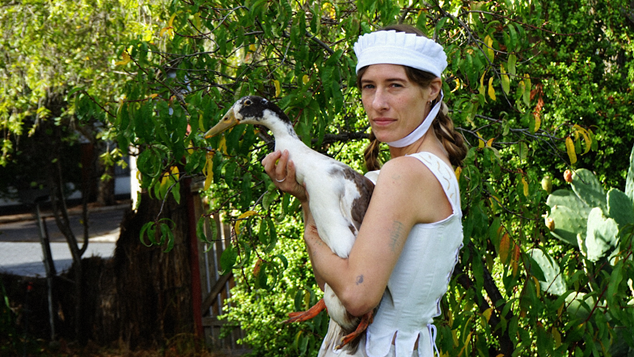
Adelaide musician Workhorse has shared a new video for one of the tracks from their acclaimed No Photographs album.
The clip, filmed on Super8 at the Adelaide Medieval Fair, is the perfect accompaniment for the tune Mary Maiden, which is a reimagining of a the Joan Baez song River in the Pines.
Workhorse is the western-tinged, dream-pop project of Kaurna land singer-songwriter and multi-instrumentalist Harriet Fraser-Barbour. Since it’s release last month, the album has been highly praised by music critics and been featured on many radio stations including Melbourne’s 3RRR, Sydney’s 2SER and Perth’s RTRFM – who made it their feature album of the week.
Upon the album’s release Fraser-Barbour spoke about the decision to reinterpret the much loved song from the 60’s folk icon.
“This song is a cover – a reimagining of the song ‘River in the Pines’ by Joan Baez, who I adore not only as the beautiful angelic folk singer that she is, but also for her powerful dedication to human rights activism, her involvement in non-violent civil rights movements and her support of LGBTQI+ rights.
“There’s a Joan Didion essay on Joan Baez which I think of a lot… It describes spending time with Joan as she sets up ‘The Institute for the Study of Nonviolence’ which despite sounding super official and methodical, was just a space, a room, where kids, teenagers and young adults could get together and just talk, discuss ideas, share a meal. Lie on the floor, stretch, listen, all under the supervision of ethereal Joan Baez.
“To me that’s really beautiful. Joan is the kind of music that I grew up listening to. My mum is really into that kind of traditional folk and folk revival stuff so it has very nostalgic qualities for me. I feel like I have this spirit alter ego who is like a maiden dancing around a maypole somewhere in an alternate dimension, and maybe that’s a part of my old English ancestry that I’m trying to connect with.” Fraser Barbour said.
“I love the imagery that a lot of this music carries, great descriptions of nature, of the values of a different time, songs of friendship, the heartbreak of the betrothed. And throughout a lot of this music, there’s an underlying melancholic quality that really resonates with me.
Fraser-Barbour said the decision to include the song on the album came after they shared it with a friend who also had a love for the classic folk sound.
“I decided to include this cover after sending a demo to a friend. This friend and I really bonded over a shared love of this kind of traditional folk and folk revival stuff – Fairport Convention, Pentangle, Sandy Denny, Anne Briggs etc. and she encouraged me to share a more finalised version of the cover. For me it represents my musical roots and it felt fitting to include something in this vein, despite the end result of most of the other songs on this album being pretty far removed from this.
“I think ‘covers’ have become a dirty word in more recent history – whereas in the past, this was a very accepted traditional norm, to retell and recreate the stories told through song as a means of oral preservation. Folk songs passed down through history, preserved through generations, a bit like Aboriginal songlines.
“There is also a fun kind of gender play that happens in covers, say where a female singer takes on a narrative traditionally written to be told from the first person perspective of man to woman. That doesn’t happen in this song specifically, but it does in plenty of other Joan Baez songs like Once I Knew a Pretty
Girl which sings;
Once I knew a pretty girl
I loved her as my life
I’d gladly give my heart and hand
To make her my wife
“There’s a section on the queer nature of covers in the book Paul Takes on the Form of a Mortal Girl by Andrea Lawlor which explains that male singers will almost always change the original lyrics to suit a hetero narrative, while female singers will keep the original lyrics regardless of what narrative that becomes.
“That obviously says a lot about the inherent homophobia a lot of men face or feel towards themselves and others, and that feels incredibly lonely.” Fraser-Barbour said.
Take a look at the video.
OIP Staff, image: Chelsea Farquhar
You can support our work by subscribing to our Patreon
or contributing to our GoFundMe campaign.





